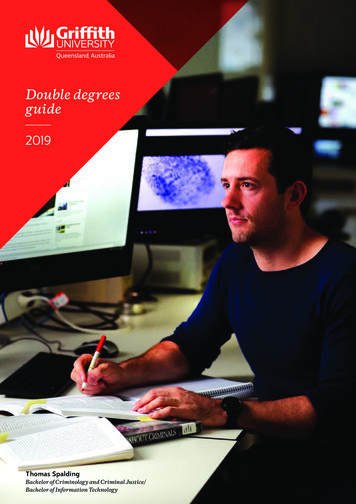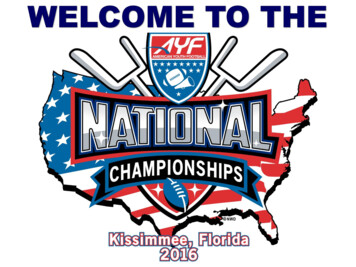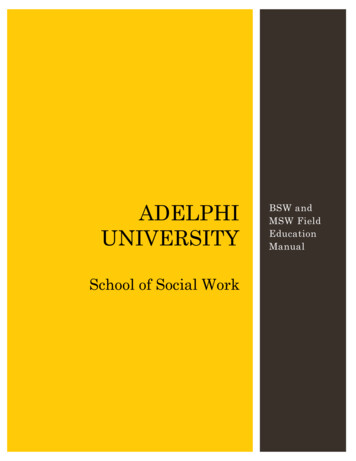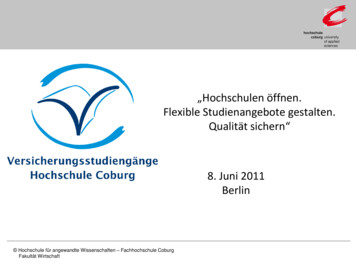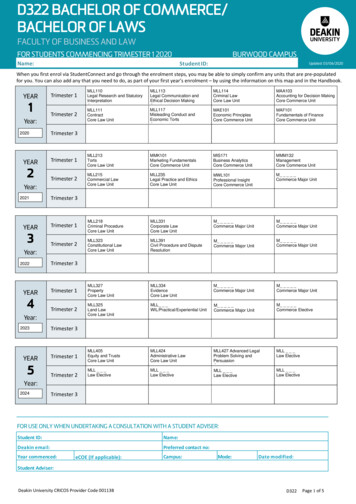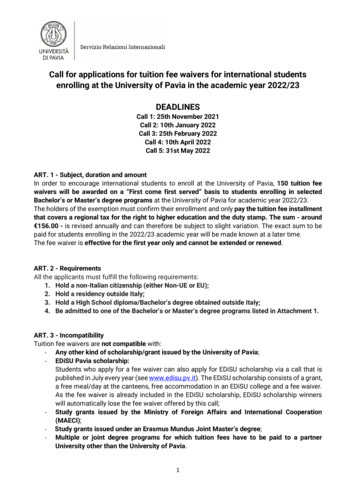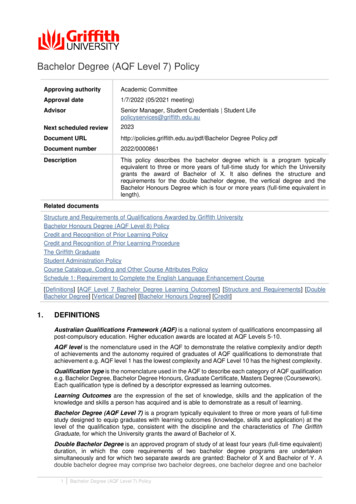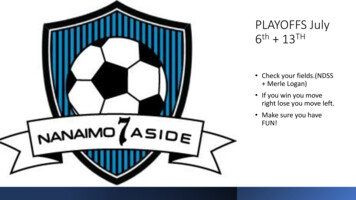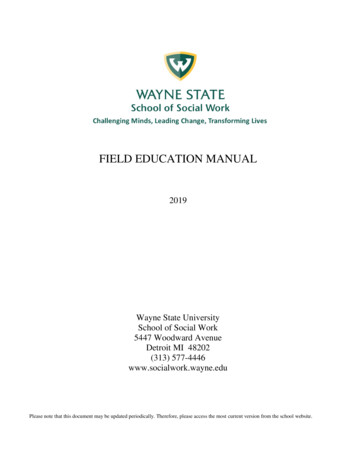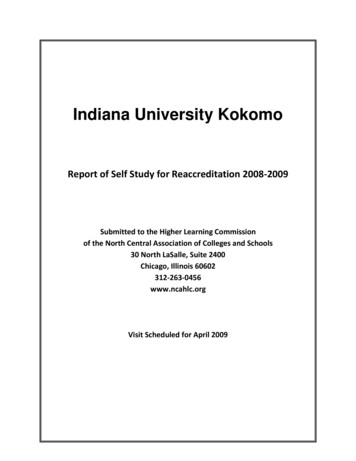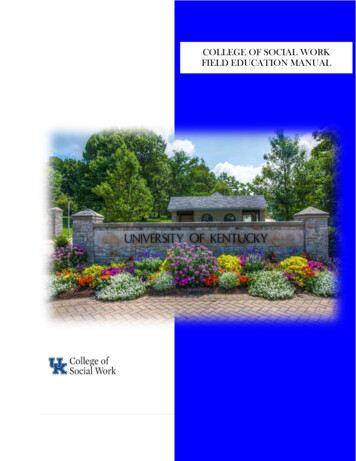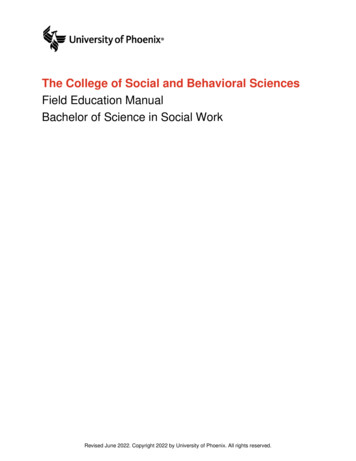
Transcription
The College of Social and Behavioral SciencesField Education ManualBachelor of Science in Social WorkRevised June 2022. Copyright 2022 by University of Phoenix. All rights reserved.
Bachelor of Science in Social WorkField Education ManualPage 2 of 36Table of ContentsThe College of Social and Behavioral Sciences . 1Section I . 4Introduction . 4Mission Statement of the BSSW Program . 5Role and Purpose of Field Education . 5Objectives . 5Program Accreditation . 6Field Education . 7Field Education Courses . 7Field Education Hours. 8Completing Field Education Hours Prior to Week 15. 9Field Education Tasks. 9Preparing for Field Education . 10Placement Process . 10Final Site Approval . 12Eligibility . 12Criminal Conviction and/or Unethical Behavior . 13Section II . 14Safe Practices . 14Safety in Field . 14SAFETY GUIDELINES . 15Safety Roles and Responsibilities . 16Assessing Situations for Risks . 17Student Expectations and Responsibilities. 18Resolving Issues within Field Placement . 18Requirements for Field Placements within Employment settings . 19BSSW Roles and Responsibilities . 20Roles and Responsibilities . 20Documents and References for Field Education . 23Section III . 24Affiliation Agreements with Organizations . 24Liability Insurance . 24Revised June 2022. Copyright 2022 by University of Phoenix. All rights reserved.
Bachelor of Science in Social WorkField Education ManualPage 3 of 36Safety and Risk Management. 24Select University Policies . 25Professional Standards. 25Process . 25Social Media and Professional Communication . 26Frequently Asked Questions about the BSSW Field Education Program . 26How do I obtain a field unit and a field placement?. 26How much time do I spend at field placement? . 27How many credits are the field placement and integrative seminar? . 27Can I be exempted from part of the field placement if I have prior experience? . 27Is a caregiver/criminal background check required for field placement? . 27Are employment-based field placements available? . 28Do I need a vehicle for field placement? . 28What do I do if I have questions, issues, or concerns about my field placement? . 28Is the field course graded or pass/fail? . 28Questions? . 29CSWE Core Competencies. 30BSSW Learning Objectives, as defined by the Council on Social Work Education’s 2015Educational Policy and Accreditation Standards . 30Demonstrate ethical and professional behavior . 30Engage Diversity and Difference in Practice . 30Advance human rights and social, economic, and environmental justice . 31Engage in practice-informed research and research-informed practice . 31Engage in policy practice . 32Engage with individuals, families, groups, organizations, and communities . 32Assess individuals, families, groups, organizations, and communities . 33Intervene with individuals, families, groups, organizations, and communities . 33Evaluate practice with individuals, families, groups, organizations, and communities . 34References . 34Appendix I – CSWE Field Education Labor Regulations . 35Internships, Department of Labor Regulations, and Social Work Field Education: Setting theRecord Straight . 35Revised June 2022. Copyright 2022 by University of Phoenix. All rights reserved.
Bachelor of Science in Social WorkField Education ManualPage 4 of 36Section IIntroductionWelcome to Social Work Field Education!As Field Director for the Social Work program, I am thrilled to partner with you in your field educationjourney. Field Education serves as the signature pedagogy of Social Work Education, intended to be theopportunity where students to weave the theoretical foundations learned in the classroom, into theirpractice as a professional. Through field education, students learn many critical skills and valuable toolsto think and act ethically in collaborating with our field team, site supervisors, and expert faculty.Students begin to practice these opportunities as they relate to the Council on Social Work Education’s(CSWE) competencies within the 2015 Educational Policy and Accreditation Standards (EPAS). Thesestandards guide the College throughout the development of all curricula within the program and areintentionally applied within the field setting.This field manual should serve as a resource and guide to students and field instructors involved in FieldEducation. We hope you will find all the content and information you need here in order to besuccessful in this experience. If you have any questions or concerns, the first point of contact forstudents and faculty instructors is the assigned Field Faculty as described in this field manual. We aregrateful for the opportunity to lead you in Field Education and for your commitment to the process, asthis is an expression of your commitment to lifelong learning in our profession. We look forward topartnering with you in your journey and transformation!Kristen Mitchell Samuels, Ed.D., MSW, MS, MEdField DirectorKristen.samuels@phoenix.eduRevised June 2022. Copyright 2022 by University of Phoenix. All rights reserved.
Bachelor of Science in Social WorkField Education ManualPage 5 of 36Mission Statement of the BSSW ProgramThe mission of the Bachelor of Science in Social Work program is to empower students to develop intoeffective, ethical, culturally aware social workers who advocate for social change and promote resiliencein a rapidly evolving global environment. Graduates will be prepared to apply knowledge, skills, andsocial work values to enhance the lives of diverse individuals, families, organizations, and communities.Role and Purpose of Field EducationThe Field Education component in the BSSW is designed to connect the theoretical and conceptualcontributions of the classroom environment to experience in a practice setting. Under the supervision ofa qualified Social Work professional and assigned faculty, students are empowered to implementknowledge, theory, and concepts hands-on within a social work agency.During the BSSW program, each student completes Field Experience in either two 15-week FieldEducation Experiences in SWRK/405 Field Education I and SWRK/420 Field Education II, or in a single 15week block placement SWRK/425. These courses have been strategically placed within the program toallow for scaffolded application of previous course content. Students do not begin Field Education untilthe appropriate prerequisites have been met. Each of these courses includes assessments which willmeasure proficiency in all nine competencies of the Council on Social Work Education (see objectivesbelow), and will include a minimum of 400 hours total. These hours provide students with theopportunity to practice the knowledge, values, skills, and cognitive and affective processes of generalistpractice, demonstrating competency and preparedness as generalist practitioners.Coursework students complete during their Field Education phase is designed to provide facultymentorship and guidance throughout the field education process. Collaborative learning experiences areexpertly facilitated by the Field Faculty to allow students to effectively process their individual fieldworkexperience. Students will actively engage in the classroom process, which includes case presentations,opportunities to give and receive both supportive and constructive feedback, and space to processchallenges and progress and use role-playing and self-disclosure to further develop skills in selfawareness, self-regulation, and critical thinking.While serving at the chosen agency, students are monitored directly by an agency supervisor andsupervised by their UOPX faculty member. Field Education courses provide opportunities for students toserve individuals, families, and group clients in community settings. Students are evaluated based oncriteria by which students demonstrate the Social Work Competencies in the field setting.ObjectivesField Education prepares each student by achieving the following objectives:Revised June 2022. Copyright 2022 by University of Phoenix. All rights reserved.
Bachelor of Science in Social WorkField Education ManualPage 6 of 36 Students integrate classroom learning within the practice setting of field education. Students are prepared for professional Social Work practice in various systems and settings, andwith diverse client populations. Students have the opportunity to use Social Work knowledge, skills, values, professionalbehaviors, and ethics in their professional practice. Students practice skills and interventions within micro, mezzo, and macro settings as they relateto generalist practice. Students demonstrate proficiency in the bachelor-level 2015 CSWE Social Work Competenciesas outlined in the 2015 Educational Policy and Accreditation Standards (EPAS):oooooooooDemonstrate Ethical and Professional BehaviorEngage Diversity and Difference in PracticeAdvance Human Rights and Social, Economic, and Environmental JusticeEngage in Practice-informed Research and Research-informed PracticeEngage in Policy PracticeEngage with Individuals, Families, Groups, Organizations, and CommunitiesAssess Individuals, Families, Groups, Organizations, and CommunitiesIntervene with Individuals, Families, Groups, Organizations, and CommunitiesEvaluate Practice with Individuals, Families, Groups, Organizations, and CommunitiesProgram AccreditationUniversity of Phoenix’s Bachelor of Science in Social Work Program is accredited by the Council on SocialWork Education’s Commission on Accreditation.Accreditation of a baccalaureate or master’s social work program by the Council on Social WorkEducation’s Commission on Accreditation indicates that it meets or exceeds the criteria for theassessment of program quality evaluated through a peer-review process. An accredited program hassufficient resources to meet its mission and goals and the Commission on Accreditation has verified thatit demonstrates compliance with all sections of the Educational Policy and Accreditation Standards.Accreditation applies to all program sites and program delivery methods of an accredited program.Accreditation provides reasonable assurance about the quality of the program and the competence ofstudents graduating from the program.For more information about social work accreditation, you may contact Accreditation.Revised June 2022. Copyright 2022 by University of Phoenix. All rights reserved.
Bachelor of Science in Social WorkField Education ManualPage 7 of 36Field EducationField Education CoursesField Education courses are designed to provide a complementary experience between the classroomand the field by providing students the opportunity to debrief with peers, review any challenges, discusscommonalities, and receive reinforcement from their instructor and peers. Grades for field educationwill be evaluated based on a combination of the following: Achievement in demonstrating CSWE competencies in the field setting Adherence to the NASW Code of Ethics, the University of Phoenix Student Code of Conduct, andthe Professional Standards Scores on all assignments and coursework Evaluations and feedback from agency representatives Culmination of all other field outcomes and determined by the Field Faculty.Students must earn a C or better in SWRK/405 and SWRK/420 or SWRK/425 in order to proceed to thenext course in the sequence. A grade of C- is not accepted and students may repeat the course no morethan once if the minimum grade is not earned.SWRK/405 Advanced Field Education IThis is a 15-week course requiring at least 200 hours of Field Education, or an average of 12-15 hoursper week committed to a field placement site. This course provides students an opportunity to integrateand apply their generalist practice theories within field education. Students will be required todemonstrate knowledge, skills, values, and affective and cognitive dispositions learned in previouscourses. Field education will be a combination of classroom activities, field supervision, and agencyactivities. In addition to the field work, students will attend a seminar (online students must meetweekly online course requirements) for faculty supervision and evaluation of student demonstration ofSocial Work Competencies. (3 credits). This course may not be taken as Directed Study.SWRK/420 Advanced Field Education IIA continuation of SWRK/405, this course provides 15 additional weeks of supervised generalist practicewithin the community. This course requires at least 200 additional hours, or an average of 12-15 hoursper week, committed to a field placement site. Seminars are provided to offer support and supervisionof student activities during a student’s Field Education (online students must meet weekly online courserequirements). This course offers a continuation of agency-based hours necessary to demonstrateincreased Social Work knowledge, skills, values, and affective and cognitive dispositions. (3 credits) Thiscourse may not be taken as Directed Study.SWRK/425 Field Education BlockThis is a 15-week accelerated Field Education course which is a combination of SWRK/405 andSWRK/420, where all classroom activities and hours are completed within one 6-credit course. Thecourse requires a minimum of 400 hours or an average of 26-30 hours per week within a field placementsite. This course provides students an opportunity to integrate and apply their generalist practiceRevised June 2022. Copyright 2022 by University of Phoenix. All rights reserved.
Bachelor of Science in Social WorkField Education ManualPage 8 of 36theories within field education. Students will be required to demonstrate knowledge, skills, values, andaffective and cognitive dispositions learned in previous courses. Field education will be a combination ofclassroom activities, field supervision, and agency activities. In addition to the field work, students willattend a seminar (online students must meet weekly online course requirements) for faculty supervisionand evaluation of student demonstration of Social Work Competencies. (6 credits). This course may notbe taken as Directed Study.Field Education HoursField Education courses are an essential component of the program. Students must complete theminimum required hours for each Field Education course. The hour requirement is set as a minimum of400 hours, but we encourage students and field instructors to instead focus on the competencies andobjectives being met. The agencies provide rich and diverse opportunities which the University believesteach the Social Work competencies and allow demonstration of the essential knowledge, skills, values,and affective and cognitive dispositions in a hands-on environment. Exposure to the many aspects ofField Education can provide students with valuable real-world experience.In addition, it is important for students to fulfill the coursework that occurs in the Field Educationcourse(s). This sequence creates a developmental progression of academic proficiency and professionalcompetency.If students miss two or more days in the field, they risk falling behind in coursework and losingconsistency within the agency. We strongly recommend that if a student has any absence greater thanseven days, he/she pursue a leave of absence with the University. In addition, meeting with ourDisability Resources department is advised to develop an accommodation if necessary. An Incompletegrade may be assigned in consultation with the Field Director.Some agencies require a mandatory orientation or training that must be completed prior to beginningplacement hours. A maximum of twenty-four (24) hours can be credited for training per course andmust be approved by the field instructor and Field Faculty prior to the training. Students should not haveclient contact prior to or without University liability insurance, which becomes effective on the first dayof a student’s field education course. See section III of the Field Manual for more information on therequired liability insurance.If a student is placed within a school social work setting, students must follow the host district calendarfor holidays, closings, and breaks. If school is not in session, students are not permitted to have contactwith clients. For that reason, it is important to discuss school calendars with the Field PlacementCoordinator and Field Instructor to be sure minimum hour requirements can be met.Please see Appendix I for CSWE’s Field Education Labor Regulations.Revised June 2022. Copyright 2022 by University of Phoenix. All rights reserved.
Bachelor of Science in Social WorkField Education ManualPage 9 of 36Completing Field Education Hours Prior to Week 15Field Education agency hours and classroom hours are intended to provide a complementary experienceby giving students the opportunity to debrief with peers, review any challenges, discuss commonalities,and receive reinforcement from their instructor and peers. Field Education is designed with the agencyand coursework synchronized. For this reason, it is important that students attend both aspects until theend of the course. Students may not bank hours to end field education early, or before Week 15. Thehour requirement is set as a minimum number of hours, but we encourage students and field instructorsto instead focus on student attainment of objectives and demonstration of competencies.Students must receive an acknowledgment from the Field instructor before officially concluding therelationship with the agency. Appropriate professionalism and termination with any client contactsshould also occur. Students are then required to maintain attendance for any remaining University ofPhoenix course time/classroom sessions.Field Education TasksField experiences typically occur within social service agencies, although there is flexibility in theorganization if the placement provides learning activities that align with CSWE competencies. Thisincludes remote learning opportunities when in-person contact with the population is limited orrestricted. Examples of common social work or social welfare agencies include the following: domestic violence/sexual assault programs aging or end-of-life care facilities child protection services disability services schools non-profit organizationsExamples of bachelor-level tasks during field placement include the following: Micro (Individuals)o Non-clinical intakeso Needs assessmentso Case managemento Resource referral Mezzo (Families, Groups)o Family supportive serviceso Psycho-educational groups Macro (Organizations and Communities)o Community and/or political advocacyRevised June 2022. Copyright 2022 by University of Phoenix. All rights reserved.
Bachelor of Science in Social WorkField Education ManualPage 10 of 36oooooResearch projectsProgram developmentCommunity partners collaborationCommunity outreachSocial policy initiativesSocial Work is a diverse profession and there are many directions to take your field experience todevelop generalist practice skills. Students are encouraged to focus on the population or service theyintend to pursue following graduation to gain greater exposure and experience with that population.The Field Experience is meant to give students practical experience to better prepare them for theircareers, so it is important to select an agency that can provide skills and networking opportunities toexplore job prospects.Preparing for Field EducationA Field Education Preparation Workshop is required mid-way through the BSSW program. This point inthe course sequence allows for adequate time to prepare for the documentation, processes, andclearances needed for a successful placement experience. The Field Education Preparation Workshop isself-paced and provides students with all the information they need to prepare for their Field Educationexperience. In this workshop, students will explore the purpose of and requirements for field education,identify the steps in the field education placement process, review the documents required and thesystem to submit them in, and review safe practices that are expected while in the field. Additionalresources are provided to support students throughout the experience including resume samples,interviewing tips, and various tutorials from Career Services. Access to this workshop will be madeavailable to students in their SWRK/360 course, accompanied by outreach from their Field PlacementCoordinator to initiate Field Education planning.A dedicated Field Placement Coordinator will be assigned to each student to prepare for field educationcourses. The Field Placement Coordinator’s role is to support students and provide resources andguidance to ensure a positive Field Education experience. The Field Placement Coordinator can helpstudents locate and select an agency, complete required paperwork on time, and assist in locatingresources that will help students succeed in Field Education.Placement ProcessStudents work with a dedicated Field Placement Coordinator (FPC) to prepare for field placementcourses. The FPC’s purpose is to provide students with support and resources to ensure a positive FieldEducation experience. The FPC can help students locate and select an agency. A list of possible SocialWork agencies is available through our database, Tevera, and options will be discussed during scheduledcheck-ins with each student. Students may also recommend agencies which provide social serviceswithin their communities, and these recommendations will be vetted by the Field Placement staff forsuitability. The agency approval process can take 4-6 months after formally applying for a placement.Revised June 2022. Copyright 2022 by University of Phoenix. All rights reserved.
Bachelor of Science in Social WorkField Education ManualPage 11 of 36Students, Field Faculty, field instructors, and field administrators will use the Tevera platform to accesshour logs, agency lists, evaluations, and other field-related documents. Students will begin to access thisresource as a part of the SWRK/360 course. At this point in the program, the Field PlacementCoordinator will be in touch with students to assist with registering for a Tevera account and otherdocumentation necessary to initiate the placement process. Information and resources to becomefamiliar with Tevera are available here. Students should not register for a Tevera account prior to theirenrollment in SWRK/360.Students must have appropriate supervision throughout Field Education. A qualified “field instructor”will have: A BSW or MSW degree from a CSWE-Accredited program At least 2 years of post-graduate experience Availability to provide at least one hour per week of supervisionThe field instructor will help monitor students’ demonstration of professional conduct and providefeedback on the student’s performance in practice. Additional roles and responsibilities for FieldInstructors are detailed in the sections below. The proposed Field Instructor at the placement site will bereviewed for fitness and confirmed by the Field Department within Tevera.The University enters into contractual agreements (called Affiliation Agreements) with Field Educationsites. These agreements clarify expectations and seek to ensure students have rich training andsupervision experience. A list of sites at which students have previously served is made available tostudents early in the program, and students are encouraged to make careful decisions regarding theselection of Field Education sites. Students sometimes receive employment opportunities in the settingswhere they have completed their Field Education placements, although this is not guaranteed. If thestudent is already a current employee of the agency, the student must perform new duties under aseparate Field Education supervisor in order to gain new professional experience and prevent aprofessional conflict of interest. Students in this scenario are required to complete an “EmployedPractitioner Agreement” detailing separate responsibilities, supervision, and schedules, approved by theagency and the Field Department in advance of the course.In most cases, Field Education hours will be volunteer hours. However, if a Field Education agency offersa student payment for hours worked, Field Education policies do not prohibit the student fromaccepting the offer.After the student reviews the agencies in T
University of Phoenix's Bachelor of Science in Social Work Program is accredited by the Council on Social Work Education's Commission on Accreditation. Accreditation of a baccalaureate or master's social work program by the Council on Social Work Education's Commission on Accreditation indicates that it meets or exceeds the criteria for the
